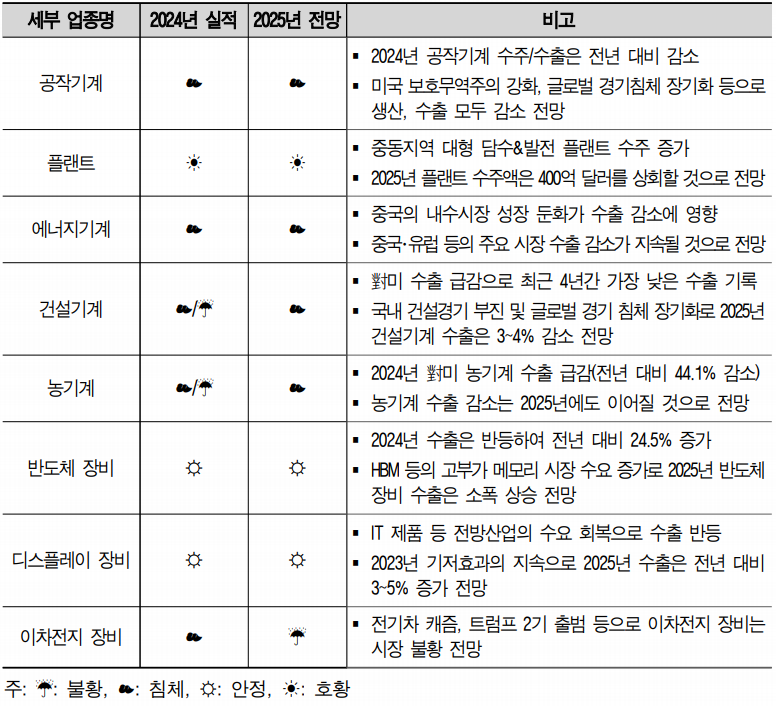과학기술정보통신부 산하 한국기계연구원(원장 류석현)은 국내 기계산업의 성과와 전망을 담은 기계기술정책 제118호 ‘기계산업 2024년 성과와 2025년 전망’을 발표했다. 이에 따르면 2025년 국내 기계산업이 지정학적 리스크와 경기 불활 등의 부정적 요인으로 인해 소폭 감소할 것으로 전망됐다.

▲기계산업 세부 업종별 2024년 실적 및 2025년 전망
지정학적 리스크·건설경기 불황 장기화 등 부정적 요인
2025년 국내 기계산업이 지정학적 리스크와 경기 불활 등의 부정적 요인으로 인해 소폭 감소할 것으로 전망됐다.
과학기술정보통신부 산하 한국기계연구원(원장 류석현)은 국내 기계산업의 성과와 전망을 담은 기계기술정책 제118호 ‘기계산업 2024년 성과와 2025년 전망’을 발표했다.
이에 따르면 2024년 기계산업은 전방산업의 경기 침체 여파로 생산이 2.8% 감소한 150조원을 기록했다.
수출은 소폭 감소(0.8%)한 609억달러, 수입은 3.8% 증가한 538억달러를 기록했다.
2025년에는 중동 지역의 대규모 플랜트 수주가 긍정적 요인으로 작용할 것으로 보이나, 지정학적 리스크와 건설경기 불황 장기화 등의 부정적 요인이 더 크게 작용할 것으로 예상돼 생산과 수출 모두 감소할 것으로 전망된다.
업종별로는 공작기계 분야는 2024년 공작기계 수주 누계액은 전년 대비 2.8% 감소했으며, 주요 수출 시장인 미국과 중국의 경기 위축으로 인해 수출이 13.9% 줄었다. 2025년에는 글로벌 경기 둔화와 보호무역주의 강화 가능성 등 부정적 요인으로 인해 생산과 수출이 3∼5% 감소할 것으로 예상된다.
플랜트 분야는 중동 지역의 대형 담수발전 프로젝트 추진으로 인해 수주액이 전년 대비 12.9% 증가했으며, 원전 등의 대형 프로젝트 수주도 기대되어 2025년에도 호황이 지속될 전망된다.
에너지 기계 분야는 중국 내수 시장 성장 둔화로 인해 아시아 지역 가열 난방기 수출이 전년 대비 24.9% 감소했다. 2025년에는 미국 시장을 중심으로 수출이 증가할 것으로 기대된다.
건설기계 분야는 2024년 건설기계 수출은 글로벌 건설경기 불황으로 전년 대비 29.0% 감소한 51.7억 달러를 기록했다. 2025년에도 건설경기 불황이 지속될 것으로 예상되나, 인도의 대규모 인프라 프로젝트와 배터리 관련 광산장비 수요 증가가 긍정적 요인으로 작용할 것으로 보인다.
농기계 분야는 2024년 대미 수출 급감으로 인해 전년 대비 20.1% 감소한 8.8억 달러를 기록했다. 2025년에도 북미와 유럽 시장의 부진이 지속되어 8∼9% 감소할 것으로 예상되나, 우크라이나 재건 사업을 통한 수출 다변화로 하반기부터 점진적인 회복이 기대된다.
주요 산업의 전망을 살펴보면 반도체 장비 시장은 반도체 수급 조절과 수요 회복 노력으로 시장 규모가 증가하고 있으며, 2025년에도 성장세를 이어갈 것으로 보인다. 디스플레이 장비 분야도 IT 제품 등 전방산업의 수요 회복에 힘입어 성장세가 지속될 것으로 예상된다.
이차전지 분야는 전기차 시장 침체와 중국 배터리 자급률 증가로 인해 2024년 이차전지 수출이 25.5% 감소한 54.2억 달러를 기록했다. 2025년에도 이차전지 산업의 수출입, 내수, 생산이 감소할 것으로 예상되지만, 하반기부터 전기차 시장 회복과 함께 이차전지 장비 시장도 성장할 것으로 보인다.
기계연 기계정책센터 길형배 선임연구원은 “2025년 기계산업은 미-중 무역 갈등, 지정학적 리스크 등 부정적 요소와 중동 지역 인프라 투자 확대 등의 긍정적 요소가 공존할 것”이라고 분석했다.
또한 “트럼프 정부 재집권 시 보호무역주의 강화로 인해 주요 핵심 품목의 수출에 영향을 미칠 것으로 전망된다”고 덧붙였다.